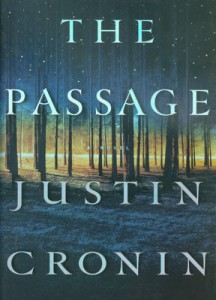| << Back |
In Review: In Review – The Passage
By Justin Cronin, as Reviewed by Macy Walsh
There are summer books, and then there are summer bricks; those tantalizing, toaster oven size tomes that strain beach totes with their sheer physical (if not always intellectual) heft. At 766 pages, Justin Cronin’s ambitious doorstop The Passage is heavyweight in more ways than one. Volume I of a promised trilogy, this apocalyptic story by a hitherto mainstream writer (a Pen/Hemingway Award winner) is not just another vampire story, but deserves a spot among the best of the genre alongside McCammon’s Swan Song and Steven King’s The Stand. Mr. King, in fact, was moved to rave like a proud uncle on the book’s back cover.
This is a creation story for this millennium, a heroic tale filled with battles between good and evil and struggles with the supernatural. It is bursting with myths and monsters and populated with men and women forging civilization after “the world has lost its memory.” The book is that memory.
Cronin gets everything right: suspenseful pacing using third-person view points that alternate throughout; interesting characters with all-too-human flaws (from pedophile laborers to nuns and FBI agents); and just enough verisimilitude in his science fiction-cum-horror plot to have readers believing his fictional apocalypse might be plausible. The narrative is presented through multiple points of view and across grand sweeps of time, making it an historical testament to the “Time Before” and all that came after, “as if a blade had fallen onto time itself, cleaving it into halves.” What makes the novel such a riveting read is that Cronin packs as much breathless action and as many compelling characters into the before as he does the after.
The Passage begins with the introduction of the story’s enigmatic central figure, 6-year-old Amy Harper Bellafonte, the product of a brief liaison between a traveling salesman and a waitress in an Iowa diner. The story of Amy’s first few years is a piercingly naturalistic tale of downward mobility amid truck stops and cheap motels. Cronin then sends his narrative into overdrive as the next two chapters let the reader in on all the basics–a virus discovered in a South American jungle is being genetically engineered by the military in an effort to create a breed of vampiric super-soldiers using death-row inmates as subjects. Little Amy, meanwhile, during a recent trip to the zoo, has displayed an apparent ability to communicate with the animals and, as a result, becomes another candidate for the program. Naturally, this being a government project and all, things don’t quite go as planned. The virus creates not one Frankenstein monster but many and these “virals” (vampires) are the beginning of the end. They escape from the “secure” facility in Colorado where the project was based and soon an end-of-the-world scenario is playing out as those who are infected hunt down those who are not. Two years later, much of the world is dead; or undead as the case may be.
In the future that makes up the middle of the novel, we see what one community has become generations later, a fortified medieval village of sorts where the lights are left on at night so the darkness won’t bring death, and where “courage is easy; it’s hope that’s hard.” Amy, abandoned at a convent early in the book, soon hooks up with Wolgast, an aging FBI agent. Like the original test subjects, Amy has psychic abilities and she appears in the dreams of many people, leading to the belief that she might be the one person who can save what’s left of the human race. She and a band of followers, including one named Peter, must journey north to where Project Noah began, and where Amy, like many characters in creation myths, becomes creator, destroyer and savior of the world.
Reportedly The Passage was inspired by the author’s daughter, who asked that he “write a story about a girl who saves the world.” There is an explosive quality to this book that destroys conventional thought, leaving your mind operating on a plane of simple survival. The impact of the reader’s connection with the characters is incredible; heroes and victims are all people audiences feel they know as they move forward or live out their final moments. Experiences are expectedly grim and there are one or two characters in whose minds you may not want to be trapped.
A riveting page turner, The Passage is never dull. What’s more, Cronin nails the ending, leaving you with just the right sort of tease that will have you waiting on the edge of your seat for the promised sequel.








